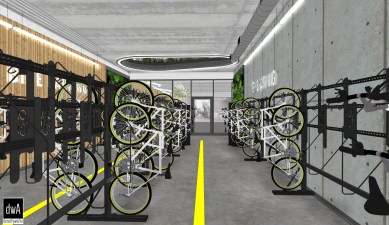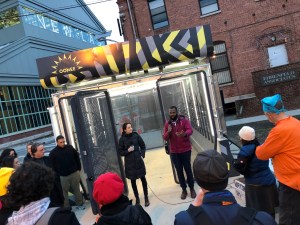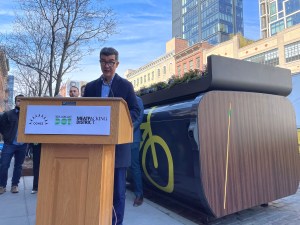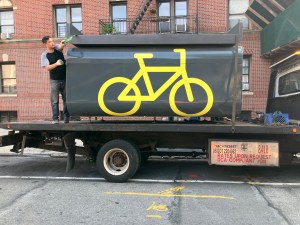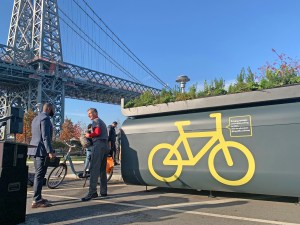The Bike Parking Revolution is Here (With Your Help)!
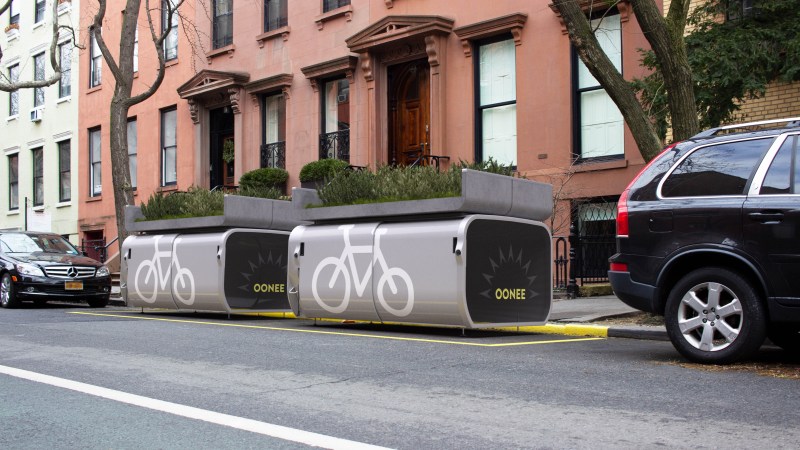
You say you want a revolution? Well, you need to start doing what you can.
Oonee — the secure bike parking company that the de Blasio administration can’t figure out what to do with — will install two new compact, ad-free curbside pods somewhere in the city, based on suggestions from the public. (Vote here.)
The units, which hold about six or seven bikes, plus a pump for public use, were funded by Voi, the scooter company. Oonee has previously sited larger pods in pilot programs near the Barclays Center, the Staten Island Ferry terminal in Manhattan and in Journal Square in Jersey City, but company founder Shabazz Stuart believes the smaller units could be rapidly deployed everywhere, once the city gives the green light and investors see that the concept works.

“This should function like bike corrals,” he said of his pods, which are unlocked with a free phone app or key card. “People should be empowered to request one of these for their curb space. Why should a person with a car be unilaterally allowed to say, ‘I’m going to take up eight feet in front of this random building?’ Why can’t the majority of residents of the block say, ‘No, we want to use that space for bike parking’ or ‘We want that space for a cafe’?”
Obviously, the first two pods won’t make money — they do not feature ads on them — but Stuart’s company hopes to deploy the larger pods and some smaller pods with ads where they are appropriate (such as in commercial districts) to underwrite many more ad-free pods in residential communities, where bike parking is essential.
The ad model is the only one that will work, Stuart said.
“Secure bike parking must be open and accessible to everyone,” he said. “We’ve learned that people don’t want to pay for another service — they already pay for bike share, for the subway, for Netflix. So advertising and sponsorship is appropriate in commercial areas, just as with bus shelters, newsstands and LinkNYC terminals. All of those are much more costly than what I am talking about, but are readily accepted. It’s not inappropriate to have advertising on one pod in Herald Square to finance 10 of the smaller pods in Crown Heights. And there will be so much demand from residential blocks where people have to currently carry their bikes up three flights.”
There seems to be universal acceptance of the idea that bike parking is a necessity in a city where cycling is booming, but there is only space for one bike for every 116 cyclists. A recent report by Transportation Alternatives said that the city is undermining local businesses, abetting a rise in bike theft, slowing the use of bikes for commuting or errand running, and even undermining public safety because of a lack of bike parking. After that report came out, Mayor de Blasio appointed intellectual property lawyer Hank Gutman to the position of DOT commissioner, with a mandate to install 10,000 bike-parking spaces by the end of the year.
Could Oonee be a part of that? Stuart says yes (but DOT declined to comment for this story).
“We’ve been singing this gospel for years: we are a born-and-bred New York City company that knows how to build beautiful bike parking facilities that are free for the city and for users,” Stuart said. “The new pods could be rented by BIDs or building owners or facilities, or the DOT could tell us where to put them.”

Voi said it was happy to help because even though it is primarily a scooter company (which is competing to win the city’s bidding process for scooter-share), the company believes that the more butts that are on bikes, the better it is for all micromobility firms (and a recent study bears that out).
“Voi launched our City Innovation Fund in 2020 to help advance new solutions around micromobility parking, safety, and sustainability,” said the company’s chief commercial officer, Carl Vernersson. “We use this fund to advance solutions that help all forms of micromobility to thrive in our partner cities. Lack of bike parking is a big challenge in New York, and Oonee offers a quick-deploy solution that works.”
It appears unlikely that the DOT will allow Oonee to deploy the two prototype pods in curbside spaces, but other non-DOT property exists.
“The goal of the prototype is clear: there are 1.6 million cyclists who are under-served,” Stuart said. “I know you hear promises all the time from start-ups, but we are advocates who are committed to this. It is rare to have a private sector operator working so hard to get something done. The city doesn’t have to do anything.”

